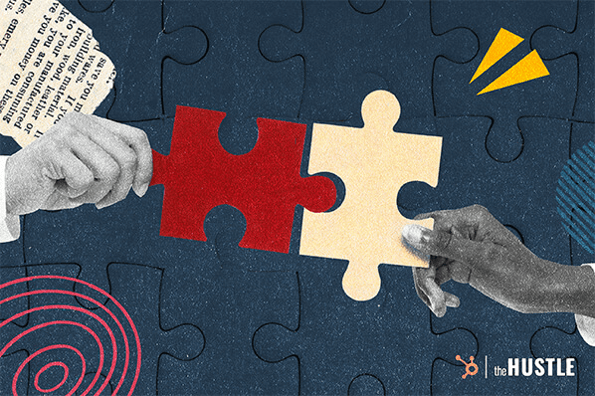When you finally take the plunge to turn your business idea into reality, there’s a lot to think about. From financing your venture to building a business model, many decisions go into laying the groundwork for a successful startup.

But, in the earliest stages of founding your business, there’s one big question: Do you want to go at it alone?
Having the right people is a vital part of any thriving business: 65% of high-potential startups fail due to co-founder conflict. And while that statistic might make you want to stay solo forever, analysis of 1k unicorns showed that 75.5% of them had two or more founders.
All this to say: A co-founder can be a major value add to your startup if you find the right one. To get you started, The Hustle poured over online resources and spoke with experts to compile a list of where — and how — to find your perfect match.
What is a co-founder?
A co-founder is a partner in all things business: a shared decision-maker who often has equal stake in the company and assumes equal risk. Commonly (though not always), co-founders are involved from the initial launch of a startup.
The expertise of co-founders can vary depending on the nature of the company. They can be businesspeople, engineers, doctors, lawyers, researchers, or artists. What matters, though, is that their skill set complements the mission of the startup and other co-founders.
“There are many benefits to partnering with someone, which include both adding skill sets that a solo founder may not possess and having access to social capital in ways that an individual might not have,” says Matthew Jones, a psychologist who runs the entrepreneur coaching company Cofounder Clarity.
Having a co-founder also takes some of the emotional hardship out of the entrepreneurship road. “I see a bit of loneliness with the solo journey,” Jones says of his clients. “For startup founders, there’s a blurred identity between themselves as individuals and as professionals, so having a support system can be really beneficial.”
Additionally: “Investors are increasingly viewing partnerships as more stable than solo founders.”
When considering whether to search for a co-founder, first consider the perks of having a partner:
- Sharing the burden: Having equal equity in a company means taking on equal pressure. Starting a company is hard, and having a partner to share the moments of stress and hardship can make it more bearable.
- Collaborating: In the early stages of a startup, you might have to turn to external sources for ideas and feedback. With a co-founder, you can keep the brainstorming session in house and have someone to bounce ideas off of.
- Splitting costs: Launching a startup sometimes requires a large amount of money upfront. If you have a co-founder, you can split the initial capital between two people.
- Getting investors: Investors want to mitigate risk whenever possible. Many are wary of investing in a solo founder as it places all the trust on a single person. Having a co-founder is an insurance policy that even in difficult times, someone is manning the ship.
- Combining strengths: A co-founder who complements your skill sets can ensure that when obstacles arise, someone is always up for the challenge.
- Expand your reach: No one knows more about the ins and outs of a business than its founder, but one person can only be in one place at a time. Two co-founders enables founders to divide and conquer, opening up opportunities that a solo entrepreneur might miss out on.
Founder vs. co-founder
If you decide to go it alone and be the sole leader of your business, then you’d assume the title of founder. Normally, when partners are brought on to share that responsibility, each individual takes the title of co-founder.
Titles might also change depending on chronology: If you start your business as a solo founder and don’t bring on a co-founder until years later, you might keep the “founder” label.
At the end of the day, there’s no science to titles and positions. The most important thing is doing what’s best for your startup and your team, and making sure all partners feel validated and respected in their positions.
How to find a co-founder
If you didn’t meet your co-founder through your personal network, the hunt for the perfect partner can seem intimidating. But don’t fret; there are tons of in person and virtual ways to find, vet, and mesh with a future co-founder.
The process looks a lot like dating: You have to put yourself out there, be honest about your expectations, and stay open-minded.
And, like building a strong personal relationship, finding a co-founder should not be rushed.
“People latch on too quickly to the notion of a co-founder, and so they rush into it,” says Kate Carney, a strategic adviser to executives and founders. “It really has to be somebody who complements your skill set and [whom] you know, can build a rapport with, and genuinely like.”
Some helpful places to begin your search include:
In Person
Personal connections:- Friends (and friends of friends)
- Family members
- Romantic partners
- Former colleagues / classmates / peers
- Affinity groups: There’s a community for almost every industry and specialty, from the Association for Computing Machinery to the Society of Professional Journalists
- Business/tech meetups: Such as events through the Entrepreneurs’ Organization or the American Marketing Association
- Conferences: Like the Forbes Under 30 Summit or HubSpot’s INBOUND
- Accelerator events/pitch competitions: Think MIT $100k or Y Combinator’s Demo Day
Online
Websites:- AngelList: A startup-focused job site that serves both job seekers and companies looking to hire
- CoFoundersLab: The site uses an algorithm to help you find a co-founder match, and also offers a 20-week program focused on growing your startup and raising capital
- FoundersList: This service lets you browse existing co-founder listings or post your own, as well as joining founder groups by region and industry
- Indie Hackers: Follow along for helpful tips and tricks for finding a co-founder or post your own callout
- StartHawk: The site pairs a search algorithm with an intuitive messaging system to help users find a co-founder who fits their startup
- Y Combinator: The matching tool of arguably the most famous startup accelerator, YC’s site matches co-founders based on interests, skills, location, and more
- Reddit: The co-founder subreddit is built around helping entrepreneurs find a co-founder; browse prior posts or submit your own
- LinkedIn: Use search terms you’re interested in and click the “people” filter as well as the location filter to narrow down profiles (for example: “technical lead” in New York City)
- Twitter: Many Twitter users put interests and job titles in their Twitter bios. You can search specific terms when looking for a possible co-founder (“former lawyer” or “MBA,” for example)
Once you’ve identified a possible lead through these methods, it’s smart to heed Carney’s caution and take your time vetting the partnership. You may hold a round of interviews, or start testing the waters in other ways.
Serial entrepreneur Melissa Kwan, co-founder and CEO of eWebinar, suggests trying a potential partner as a contractor first. Her co-founder and CTO David Dawson — who is also her life partner — first came on board the startup as a technical contractor before becoming its co-founder.
For Kwan, this method ensures the co-founder will be a good fit for the role, instead of just offering equity upfront in return for work:
“If you’re super green, how do you attract the best co-founder? One way is to work with them as a contractor and actually pay them for their work and then figure out if that’s the person you want to be married to,” she says.
How to find a technical co-founder
If you’re building a tech product and you don’t have technical expertise, it’s likely you’ll need a technical co-founder to be the CTO of your business. This is a common experience in the startup world, so technical co-founders are in high-demand.
But first consider whether you truly need a technical co-founder. With many no-code and low-code tools available, certain products and businesses can be built without having a technical founder on board.
But if your project requires deeper expertise or is tech-centric, finding a technical co-founder is likely the right move.
You can use many of the same tools above to find a technical co-founder: Simply narrow your search by using more specific technical search terms (software engineer, data analyst, computer scientist, CTO, technical lead, etc.).
When looking for a technical co-founder in person, try attending events that are tech-forward and would draw attendees with that expertise (think “hackathons,” robotics and machine learning conferences, or CES). Similarly, talk to friends and family members who have technical skill sets or work at companies that have technical departments.
What to look for in a co-founder
In an ideal pairing, experts say that co-founders play off one another and bring complementary skills to the table, while having alignment on core business goals and ethics.
“The ideal pairing that a lot of people chase after is someone who is a process-driven achiever [and] is an executor, detail-oriented, and values processes — and someone who is a validation-seeking visionary who is able to create the vision,” says Jones.
If the idea of a sales call or speaking in front of a packed conference room makes you cringe, aim to find a co-founder who thrives in those situations. If you lack planning and operational skills, prioritize that when choosing a match.
Values and financials are two more pillars of a successful partnership. “You should agree on the mission and the vision of where you want the business to go and what its values look like,” Carney advises. “And the financial one is big: making sure both founders understand not only if you want to take VC money but also the financial positions of both people.”
Carney says that a co-founder’s personal financial situation will likely influence what they want from the business and how dedicated they are to it, so it’s important to talk through it upfront.
Maintaining a successful partnership
Like any relationship, co-founder relationships take work and maintenance to keep them healthy and thriving. This means open lines of communication as well as bringing forward near-equal amounts of effort and skills.
Jones suggests implementing a communication schedule: “There needs to be a weekly check-in at least once a week, for at least 30 minutes to an hour where you can sync up.
“Make this focused exclusively on how you are communicating, how you’re feeling individually, and how you’re feeling as a team. This creates space for emotional processing.”
Being cognizant of the delicate nature of a partnership, and also of one’s own virtues and faults, can help avoid conflict long term.
“The best co-founder pairs are really self-aware of their strengths and weaknesses and their skill sets, and have good conflict resolution and communication,” says Carney.













